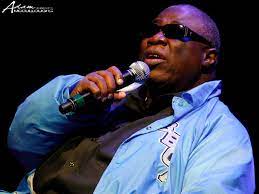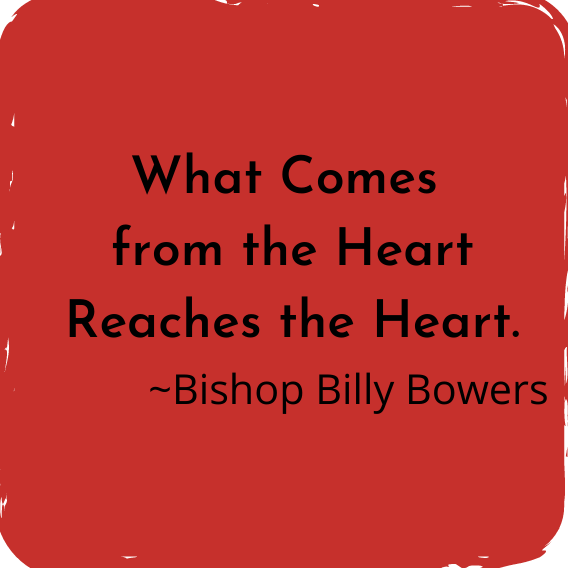In my book, Eternity through the Rearview Mirror, I profile seventeen historical figures, from Galileo to Johnny Cash. I let these people speak to us from their heavenly vantage point. Bishop Billy Bowers is not in the book, but my research for people who loved Jesus led me to him. So here is Billy, speaking to us from the heavenly realm. It’s a biography that’s an autobiography! I hope you enjoy his story.

Bishop Billy Bowers (1942—2013)
“Sometimes getting lost is a part of the bigger life, where we let our ego take a back seat, open up and admit we don’t always know what’s best.”
I was born blind.
But that wasn’t my identity—who I was. Thank God for that. I was a graduate of the Talladega Institute for the Negro Blind in Alabama, and my education there let me be Billy—not Blind Billy—simply, Billy.
You could say, though, that my identity was one with The Blind Boys of Alabama. For 23 years I was part of that God-loving, gospel-belting, Grammy-award winning group that had its roots way back in the early 1940s. It’s still going strong; our founding member Jimmy Carter is still there. I was the lead singer for years, and when it came time for my solo I’d hoist that colossal frame of mine up out of that chair and belt it out—my booming voice filled the room right up to the rafters. I didn’t need eyes to see the grins on all your faces!
We had plenty of offers to expand our music into other genres, but Jimmy always made sure we kept to our roots. If you ask what drives us, he’ll tell you: “It all has to be centered around gospel. We don’t deviate from that.” And that’s true; we may venture into country, but listen for the hymns we grew up with; they’re there.
Our 60 albums got us into the Gospel Music Hall of Fame, and we sang with all kinds of artists—from Willie Nelson to Prince. We sang in the White House for Presidents Clinton, Bush, and Obama. Have you been to one of our shows? You soon found yourself foot stomping and clapping along with everyone else, didn’t you? We can see those smiles—music to our ears. I’ll bet you’d never heard “Spirit in the Sky” or “Amazing Grace” sung the way we sing them! Want to see an overview? Click here.
The Blind Boys praise God with their singing. I sang for the Lord and preached for the Lord—it was my privilege! I ministered as a traveling evangelist, too, and in New Jersey I was fairly well known on the radio. The part I love best is telling people about Jesus. Telling them how to be safe, letting them know about Christ. It’s all about Jesus.
I loved to sing and threw my heart and soul into it. My musical ability was a gift, and I wanted the world to know it was a gift straight from God. The haloed light around me seemed to blush as I watched my friend Ricky McKinnie, who also sang with the Blind Boys, speak at my memorial service: “When you think about singing, what is from the heart reaches the heart; when Billy Bowers sang, you could feel it all straight to your soul,” he said.
These were the kind of lyrics that came from my soul:
Coming down on my bended knees
Talking to the man from Galilee
My God spoke and he spoke so sweet
I thought I heard the shuffle of angel’s feet.
I loved singing in the church but liked best to be out on the road. We went where the people were. People knew our music was special—no romantic love songs, no cuss words—and they loved it.
A reporter once asked me if I’d rather sing in church, or in places like our sold out nights at Tipitina’s, the world-famous New Orleans jazz club. “Whoever you sing to,” I told him, “even in this audience, somebody is fascinated. Somebody can see something new in their life, or will want to have a turnaround or that great change. You see . . . They go home and carry that message to someone else. . . . What comes from the heart reaches the heart.”
The 70s weren’t the best years for our gospel music, but—Glory Halleluiah!—we made a comeback in the 80s when cast in the Obie Award-winning play “The Gospel at Colonus,” with Morgan Freeman. An African-American version of Sophocles’ tragedy, this off-Broadway musical tells the story of Oedipus’s return home, seeking forgiveness, redemption, and transformation in the backdrop of a gospel church service. The rendition opened up new generations to our version of soul music.
I wasn’t born to see with my eyes; I was born to sing. And sing I did—of hope, inspiration, and faith. Give the Blind Boys a listen, and see if it doesn’t just open your eyes to God’s glory. I reckon you’ll be clapping and singing before long. (Just don’t wake the baby!)
Oh, and be sure you look me up when you get to heaven. Believe me when I say “You ain’t heard nothing yet!”
